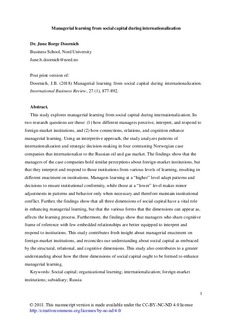| dc.contributor.author | Doornich, June Borge | |
| dc.date.accessioned | 2018-11-21T12:50:52Z | |
| dc.date.available | 2018-11-21T12:50:52Z | |
| dc.date.created | 2018-06-19T08:59:50Z | |
| dc.date.issued | 2018 | |
| dc.identifier.citation | Doornich, J. B. (2018). Managerial learning from social capital during internationalization. International Business Review, 27(4), 877-892. doi: | nb_NO |
| dc.identifier.issn | 0969-5931 | |
| dc.identifier.uri | http://hdl.handle.net/11250/2574139 | |
| dc.description | Author's accepted version (post-print). | nb_NO |
| dc.description | Available from 11/02/2021. | |
| dc.description.abstract | This study explores managerial learning from social capital during internationalization. Its two research questions are these: (1) how different managers perceive, interpret, and respond to foreign-market institutions, and (2) how connections, relations, and cognition enhance managerial learning. Using an interpretive approach, the study analyzes patterns of internationalization and strategic decision-making in four contrasting Norwegian case companies that internationalize to the Russian oil and gas market. The findings show that the managers of the case companies hold similar perceptions about foreign-market institutions, but that they interpret and respond to those institutions from various levels of learning, resulting in different enactment on institutions. Managers learning at a “higher” level adapt patterns and decisions to ensure institutional conformity, while those at a “lower” level makes minor adjustments in patterns and behavior only when necessary and therefore maintain institutional conflict. Further, the findings show that all three dimensions of social capital have a vital role in enhancing managerial learning, but that the various forms that the dimensions can appear as, affects the learning process. Furthermore, the findings show that managers who share cognitive frame of reference with few embedded relationships are better equipped to interpret and respond to institutions. This study contributes fresh insight about managerial enactment on foreign-market institutions, and reconciles our understanding about social capital as embraced by the structural, relational, and cognitive dimensions. This study also contributes to a greater understanding about how the three dimensions of social capital ought to be formed to enhance managerial learning. | nb_NO |
| dc.language.iso | eng | nb_NO |
| dc.publisher | Elsevier | nb_NO |
| dc.rights | Attribution-NonCommercial-NoDerivatives 4.0 Internasjonal | * |
| dc.rights.uri | http://creativecommons.org/licenses/by-nc-nd/4.0/deed.no | * |
| dc.title | Managerial learning from social capital during internationalization | nb_NO |
| dc.type | Journal article | nb_NO |
| dc.type | Peer reviewed | nb_NO |
| dc.description.version | acceptedVersion | nb_NO |
| dc.subject.nsi | VDP::Samfunnsvitenskap: 200::Økonomi: 210 | nb_NO |
| dc.source.pagenumber | 877-892 | nb_NO |
| dc.source.volume | 27 | nb_NO |
| dc.source.journal | International Business Review | nb_NO |
| dc.source.issue | 4 | nb_NO |
| dc.identifier.doi | 10.1016/j.ibusrev.2018.01.010 | |
| dc.identifier.cristin | 1592098 | |

